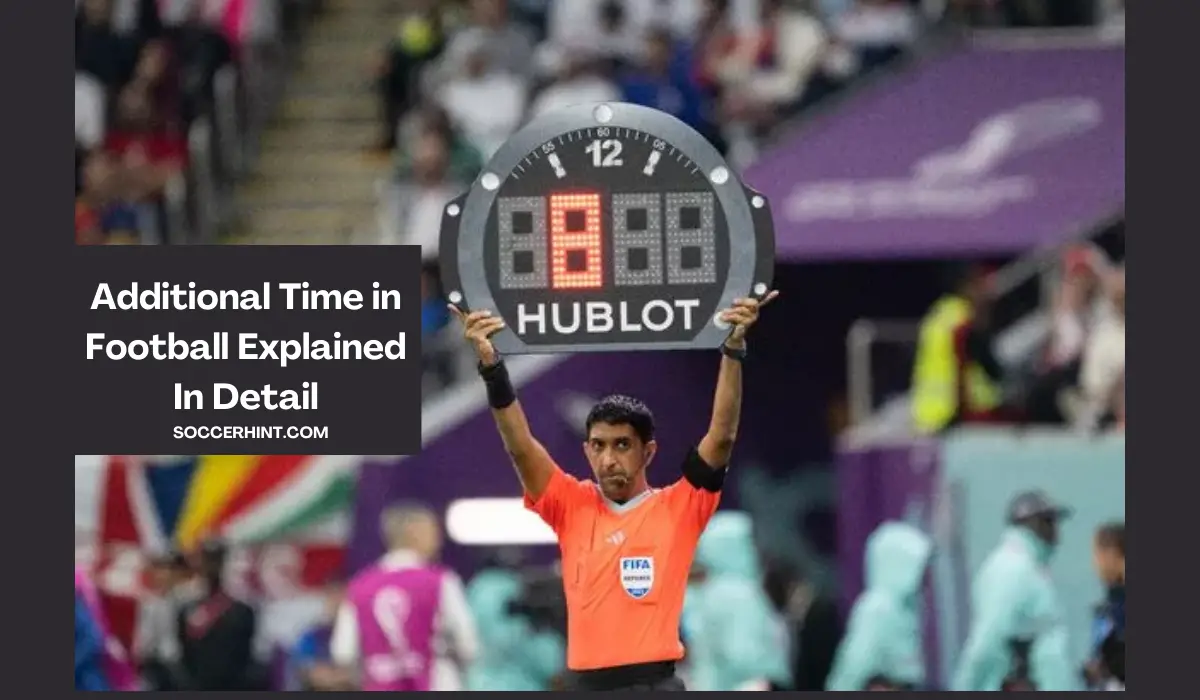Regardless of what team you support as a football fan, we have all had good and bad memories of additional time. Unless you were a Manchester United fan during the Alex Ferguson era. In this case, you lived for additional time (or Fergie time as it was called).
For the rest of us, we have memories of our teams conceding in additional time of crucial games. These goals sometimes make you question the validity of additional time in football, and why it is there in the first place. But not to worry, we are not here to reopen old wounds, rather we are here to help you understand additional time in football.
Read Also: How Football Teams Travel For Away Games
Purpose and Concept of Additional Time in Football
Additional time, sometimes called injury time or stoppage time and not to be confused with extra time, is an important aspect of football. It is a compensation for time lost during the regular 90 minutes of play. It accounts for all the time during the game when the ball is out of play. Examples of such moments are the ball going out for a throwing, a substitution, injuries, etc.
The referee decides the exact amount of time to be added. This time is then communicated by the fourth official using an electronic board that displays the amount of time allocated by the referee.
Factors that Influence Added Time
Injuries that require medical attention very often result in added time. Minor injuries count in the added time calculation alongside major injuries. They do this not only to protect the players’ health but also to prevent time-wasting tactics by those who fake injuries. This leads us to the next factor.
Time wasting is a big thing (an issue depending on who you ask) in football. Footballers and managers have numerous methods of time wasting. These include feigning injuries, players deliberately stalling Examples include faking injuries, stalling during substitutions, and delaying restarts. during substitutions or to restart play from throw-ins, corner kicks, goal kicks, and so on. Referees have to remain on alert to take account of all of these in-game and ensure every second wasted is reflected in the additional time.
Substitutions are another factor. Usually, referees add 30 seconds for every substitution being made. Since the introduction of the 5-substitution rule, additional time has increased. Other factors include cooling and drinks breaks, pitch invasion, deflated balls, VAR checks, and many others.
Why so Controversial
Why is there so much controversy around the additional time given to ensure 90 minutes of fair play in football?
Well, for one we have to look at what causes the need for additional time. Sports like basketball don’t have added time, so why does it happen in football? This is the result of football not making use of a stopwatch, unlike other sports. With a stopwatch, you can pause the time if play stops and resume it when play resumes. In football, the clock goes on when the ball is in or out of play. And that is why we have Additional time in football
The debate for the usage of stopwatches in football is one for another day but let us move on to another controversial bit of added time. Referee’s discretion. There are no hard rules regarding additional time in football. It is all down to the referee’s discretion. So, he or she can add 2 minutes in a game with more than 2 minutes’ worth of stoppages.
This makes it easy for fans and analysts to point fingers at the referee and the amount of added time given when things don’t go the way of the fans within that period of the game.
Making use of a stopwatch would solve these problems but football fans and administrators love chaos.
Extra Time, not Additional Time
Extra time should not be confused with Additional time. Additional time is added at the end of 90 minutes to compensate for all stoppages during the match. Extra time on the other hand is a different thing.
Extra time is an additional period of play that takes place after the standard 90 minutes. It is used in knockout-stage matches when there is a draw at the end of the 90. This additional period aims to determine a winner. If no winner goes to a penalty shootout.
Unlike the duration of additional time that is based on the discretion of the referee, extra time has a set duration. Extra times are 30 minutes of additional play, split into two halves of 15 minutes.
Formerly, extra times didn’t always go the full 30 minutes. We used to have the Golden Goal and Silver Goal concepts. The Golden Goal meant that once a goal is scored at any point in the extra time, the match ends. Silver Goal on the other hand meant that if a side was leading at the end of the first half of Extra Time, the match ended.
Conclusion
In conclusion, additional time is a mechanism to ensure fairness by compensating for interruptions during regular play.
So, embrace the chaos it brings because that is the beauty of football.






